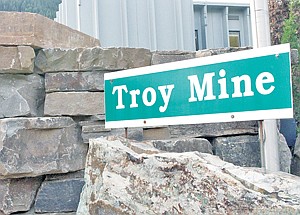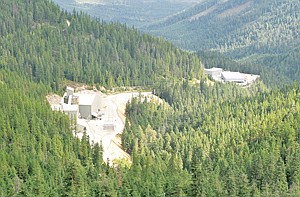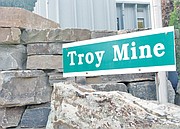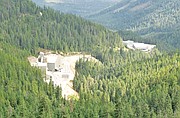Falling rock closes Troy mine
Officials at Revett’s Troy Mine hope to resume underground operations as early as today if they receive a green light from geotechnical consultants.
The geotechnical inspectors, who were expected Thursday or today, were summoned after ceiling rock began falling in an area of the mine that is not being excavated.
According to Revett Chairman Tim Lindsey, underground work was halted Saturday, Dec. 1, when Vice President of Operations Doug Miller called off excavation because of the falling rock.
Lindsey, a geologist, explained when ceiling rock falls, often there is movement of air in the normally still atmosphere of a mine.
“There was this kind of movement, and when it happens we can feel the air,” Lindsey said. “We just thought it better to get people out of there.”
Unrelated to the stoppage, Lindsey said, is a 2.9-magnitude earthquake four days later on Dec. 5.
“This is not a cause-and-effect thing,” Lindsey said downplaying Facebook posts that attributed the stoppage to the quake. “We had an extraordinarily wet November, and I think it’s more related to that than any kind of seismic activity,” Lindsey said.
Lindsey said the mine does not have sophisticated seismic-sensitive instruments that would have recorded the quake. Moreover, the mine monitoring equipment checks air movement that would indicate a wall or ceiling collapse.
The U.S. Geological Survey reported the quake at 3:41 a.m. Dec. 5 with an epicenter 21 miles southwest of Libby. The USGS does not report the depth of the quake, whether it was near the earth’s crust or much deeper.
“We did everything we were supposed to,” said Revett CEO John Shanahan.“This was strictly voluntary by our general manager (Miller). There was some movement, and we were watching it. He made the call to come out, and I fully support it. … I would never put production ahead of safety.”
The Revett mine employs 205 people, about half of whom work underground. At any one time, there are about 40 workers in the mine during their respective shifts. The rest of the workers are office, clerical, vehicle maintenance, safety and ore conversion staffers. The mine extracts silver and copper ores.
Since the closure, the ground has continued to shake in the west. At 2:48 p.m. Wednesday — a week after the Libby quake — there was a 2.8-magnitude quake in the mountains of Colorado, and a 2.7-magnitude quake in Florence, Ore. On any one day, the USGS records multiple quakes throughout the world. On Dec. 5, the USGS recorded 18 quakes around the world, of which five were in California. Other locations included New Zealand, Russia, Fiji, the Bering Sea, two each in Puerto Rico and Chile.
As for the Troy Mine workers, Shanahan said since actual ore-extraction activities have halted, some have been allowed to perform maintenance and monitoring duties. Miners also have the option of taking vacation time or just enjoy the time off without pay.
“We hope to be in operation by Monday. If not, then Wednesday or (next) Friday,” Shanahan said.





